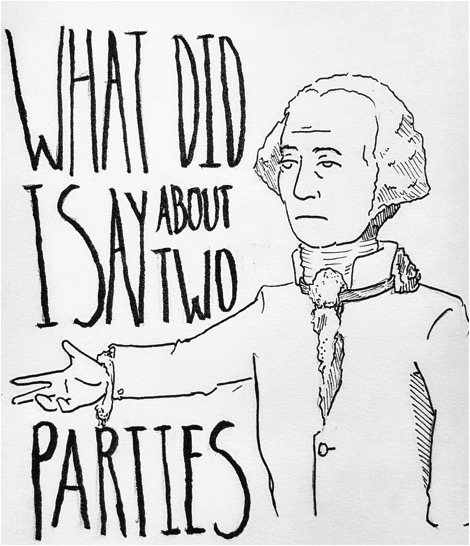
Most polls indicate that Donald Trump is going to lose this election. His loss would represent the third consecutive failure for the Republican party. More importantly, his loss epitomizes the failure of the American political system in its current state, a political system that has framed every issue as a choice between two. Citizens are caught in the middle of a constant war of Democrats vs. Republicans or left vs. right.
This election has been characterized by a hostile, never-ending war. Arguments between Trump and Clinton supporters are being fought with deep hatred, not rational dialogue. Trump supporters are labeled bigoted. Clinton supporters are labeled elitist. American politics, as they are today, remain flawed.
Democrats and Republicans are not only pitted against each other, but they are falling apart from within. The Republican party’s last president, George W. Bush, and their nominee in 2012, Mitt Romney, have both denounced Trump. Democrats, including the estranged supporters of Bernie Sanders, are similarly ambivalent of Clinton. Democrats and Republicans are talking about their own voters and candidates in the same way that they talk about each other.
When a party’s key members and supporters are skeptical of their own candidate — and vice versa — surely this indicates a flaw. Of course, the flaws of the political system stretch far beyond the confines of either the Democratic or Republican Party. More importantly, these parties hate each other.
Issues are described as a choice between two, as if there are only two possible solutions to a problem. The media does not frame issues beyond blue vs. red or liberal vs. conservative. People from both sides, including decision-makers in Washington, are pitted against each other before they even have a chance to begin rational dialogue.
Constant political gridlock — the failure to get things done because of intrinsic animosity — can be likened to this year’s election. Democrats and Republicans can not and will not work together in Washington. Trump and Clinton supporters cannot have a rational discussion that does not involve belittling and name-calling.
Here in New York City, and here at St. John’s, one wouldn’t dare publically support Donald Trump. People will be quick to label any given Trump supporter racist, uneducated, misogynistic, homophobic and xenophobic, amongst other grossly generalistic terms. The narrative that being a Trump supporter automatically makes one all these things is simply not true. People are far more complicated than the stereotypes that people seem so quick to label them with.
Yet, when people hear the word ‘Trump,’ they immediately think ‘idiot.’ That doesn’t bring about change. If one doesn’t want others to vote for Trump, calling his supporters certainly “deplorable” won’t sway them. Regardless of how a group of people appears on the outside, the individual needs to be recognized and respected.
Trump’s likely loss will be seen as a victory to many people. However, his loss also represents a failure for politics in America. The rise of Donald Trump, the antithesis of a politician, is a direct function of the increasing amount of Americans who feel alienated by the bureaucracy of the two-party system.
Clinton’s victory — a by-default win without any substance — also represents a failure for the political system. Americans will have elected Clinton as the “lesser of two evils.” What happened to a government of the people, by the people and for the people?
While Democrats and Republicans refuse to have productive conversation, Trump and Clinton supporters will do the same. Americans will continue to feel estranged by the two party system, a system that is simply not conducive to pragmatic conversation. Until that happens, politics in this country will fail to properly straighten out the issues people care the most about.













